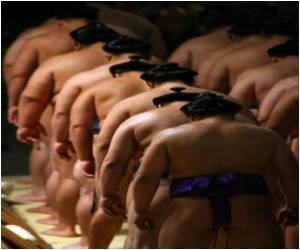Gangster-linked scandals, police raids and the loss of lucrative live television coverage are grappling sumo into submission as fans and sponsors shun Japan's ancient sport.

Experts say it must now show it can change its ways if it is to survive the latest wave of bad publicity that has shone a spotlight on the sport's worst kept secret: its links to the criminal underworld.
"Sumo is in a very dangerous position right now," said Doreen Simmons, a veteran English-language sumo commentator for Japanese broadcaster NHK.
The Japan Sumo Association has said at least 27 wrestlers, masters and others from 13 sumo stables have admitted to illegal baseball gambling and has banned more than 10 wrestlers from a tournament beginning Sunday in Nagoya.
It has fired wrestler Kotomitsuki, 34, a high-ranking "ozeki" (champion) second only to "yokozuna" grand champions, along with his stablemaster Otake, 42, for taking part in betting known to fund organised crime.
Betting in Japan is permitted only on horse racing and certain motor sports.
Advertisement
As a result, broadcaster NHK decided not to offer live broadcasts of the Grand Sumo Tournament for the first time in over half a century, depriving the sport of 500 million yen (5.0 million dollars) it pays for airing it.
Advertisement
Nagatanien's television advertisements often featured sweaty, smiling sumo wrestlers gobbling its "ochazuke" condiments used to top rice bowls mixed with boiled green tea.
That wholesome image has since been tarnished with revelations of drug use, extortion and the 2007 death of a trainee tortured during hazing. On Wednesday police raided around 30 stables in search of further wrongdoing.
While yakuza links to sumo come as no surprise to many, "the big shock is the extent to which yakuza has infiltrated sumo... and deliberately," said Simmons.
"They flatter the youngsters, wine and dine them because they are vulnerable," she added. "Unsuccessful wrestlers don't make a lot of money so they are tempted into gambling."
Those in the sport's top two divisions get regular salaries, with leading "yokozuna" champions earning as much as 2.8 million yen monthly. Those in the lower four divisions depend on living allowances shared among stablemates.
Experts point to a shortage of money that has made sumo wrestlers and stables vulnerable to organised crime. Sumo's popularity is falling as baseball and football have become the country's most popular sports.
"The yakuza have always been huge supporters of sumo, financially and in other capacities," said Jake Adelstein, author of Tokyo Vice and a specialist on organised crime in Japan.
"Many sumo wrestlers have yakuza 'patrons' who give them money under the table to supplement the sumo wrester's meagre income and reward them for their victories or encourage them to train harder."
Small stables that feature no promising fighters find it difficult to attract sponsors.
One loss-making stable even tied up with a travel agency to bring tourists to its stable, engage with wrestlers and taste traditional sumo meals as part of a package.
In response to the scandals, a revamped sumo association should have a new way of policing, including different rules for stablemasters and fewer stables because the current 50 is too many, experts say.
"Extremely small stables can't make any money. There needs to be quicker dissolution of stables because if you maintain a loss-making stable, that's where the temptation kicks in," said Simmons.
However, a more intrinsic issue facing authorities is whether they can dissolve ties that have existed for decades.
"The yakuza and sumo tie pre-dated the Second World War," said Adelstein.
"It's not uncommon for former sumo wrestlers to join the yakuza and become loan collectors or bodyguards and in some cases even executives. The police just finally decided to make an issue of it."
Source-AFP









